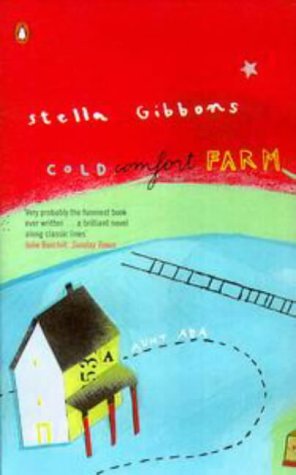 --The blurb--
--The blurb--"Flora has been expensively educated to do everything but earn her own living. When she is orphaned at 20, she decides her only option is to go and live with her relatives, the Starkadders, at Cold Comfort Farm. What relatives though. Flora feels it incumbent upon her to bring order into the chaos."
from www.amazon.co.uk
--The review--
In the novels I've reviewed recently, there have (unfortunately) been far too many silly, simpering and just downright bland female protagonists, about which I have complained vociferously of late. With Gone With The Wind being one of my all-time favourite novels, it is perhaps natural to want to compare these heroines to Scarlett O'Hara and find that they don't quite square up to her standards, but finally, in Cold Comfort Farm, readers are introduced to a heroine that not only embodies the silliness of the heroines of this period (in Gibbons' delightfully tongue-in-cheek style) but also gives us a glimmer of the future Scarlett O'Hara's devil-may-care attitude (Cold Comfort Farm having been published a mere four years before Margaret Mitchell's wartime classic).
The setting is slightly reminiscent of Frances Hodgson Burnett's The Secret Garden: a neglected dwelling nestled away in dark countryside, miles away from anything (although Burnett's residence is a rich mansion in the north of England, while Gibbons sets the action in a more modest group of farm buildings in Sussex), and the feeling of change being in the air is common to both novels. The novel is perhaps arguably also the first modern sitcom novel - the coming together of a rich finishing-school girl with more humble relatives is set up very deliberately to have hilarious and awkward consequences.
While the novel isn't laugh-out-loud funny (though I appreciate that the sense of humour of modern readers may have taken a significant shift since the book's publication in 1932), there are some amusing moments in a couple of incisive one-liners and vibrant similes and metaphors, which find humour in their apparent total randomness (though I'm sure that Gibbons worked harder on them than their effortlessness would have us believe). The characters, while in one sense clear caricatures, were also believable - the reader is led to care about them and what happens to them and is allowed to actively seek out a happy ending. The ending itself is therefore surprising. To paraphrase the Simpsons for a moment, one could confess confusion in not knowing if it's a happy ending or a sad one. Ultimately it is an ending, and that is enough - and yet upon learning that there is a sequel available, in the form of Conference at Cold Comfort Farm, as well as a collection of short stories (Christmas at Cold Comfort Farm), one immediately wants to know what will happen to Gibbons' unique cast of characters next. It is lamentable that these sequels are no longer still in print, though perhaps with a bit of clever detective work online copies may still be found (one hopes).
The notion of Cold Comfort Farm parodying sentimental rural novels of the time is a nice one, but appears initially a little too 'niche' for the vast majority of readers. However, the novels of DH Lawrence and Thomas Hardy are often flagged as touchstones for the situations and setting on which Gibbons has based her story, and upon reflection this can be detected, even if it is in no way central to understanding and enjoying the novel. Gibbons' powers of description are highly poetic while keeping the writing accessible, and the novel combines tradition and modernity with sharpness and subtle humour throughout, as well as using extremely successful character development to keep the reader hanging on right to the end.
Other works by Stella Gibbons
Nightingale Wood (1938)
Christmas at Cold Comfort Farm (1940)
Ticky (1943)
The Bachelor (1944)
Westwood (1946)
Conference at Cold Comfort Farm (1949)
Starlight (1967)
*Stella Gibbons also published several volumes of poetry during the 1930s and wrote a story for children (The Untidy Gnome, 1935).





No comments:
Post a Comment